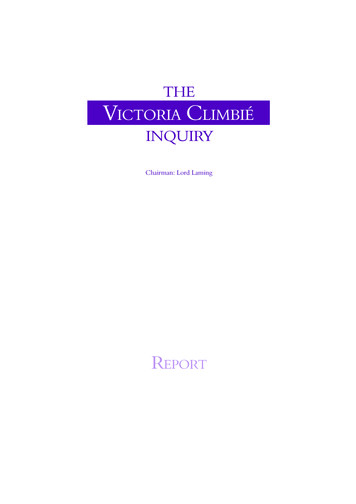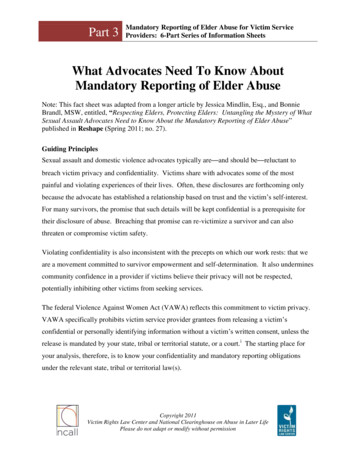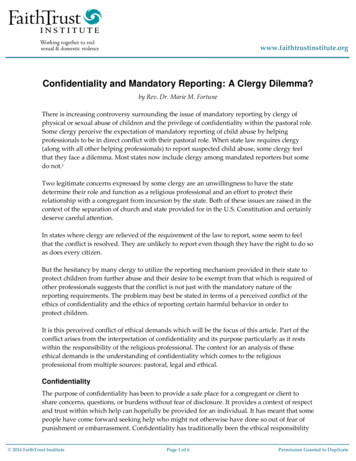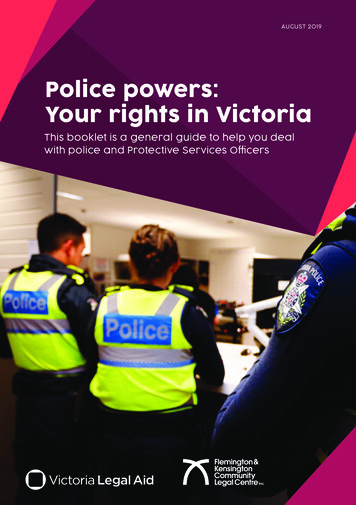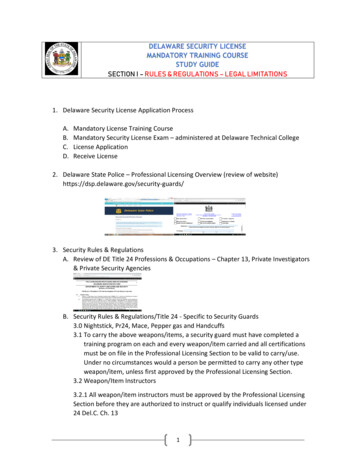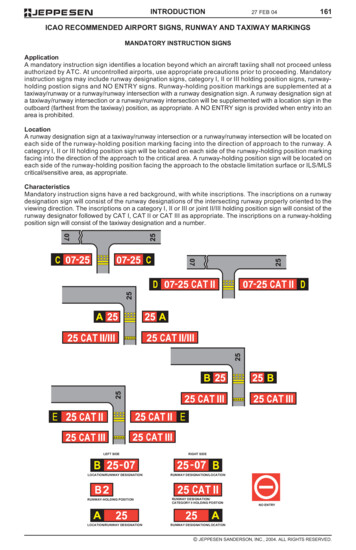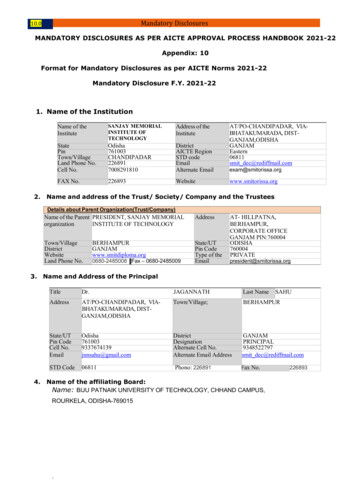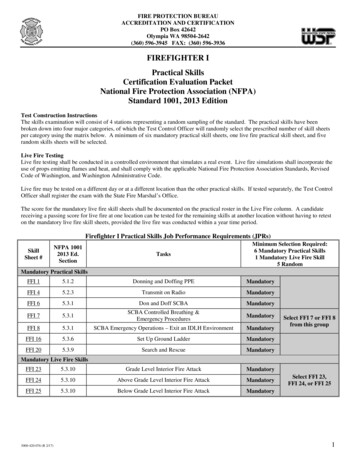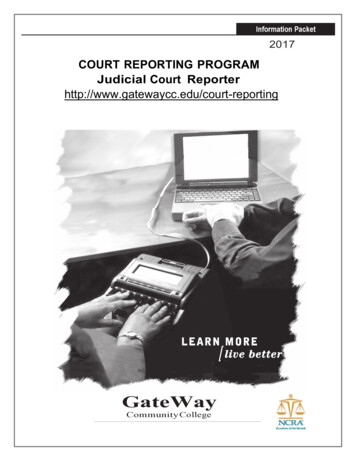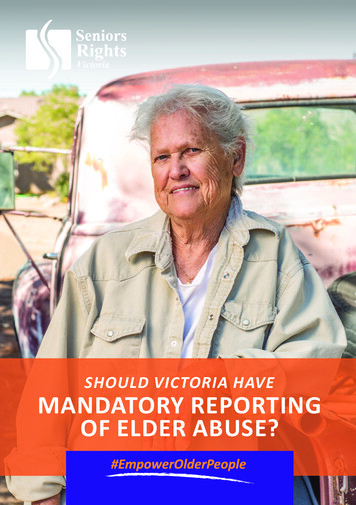
Transcription
VictoriaSHOULD VICTORIA HAVEMANDATORY REPORTINGOF ELDER ABUSE?
ABOUT SENIORS RIGHTS VICTORIAEstablished in 2008, Seniors Rights Victoria is the key state-wideservice dedicated to stopping elder abuse. It is a program of Councilon The Ageing Victoria (COTA) and supported by the VictorianGovernment. Operating under the principle of empowering olderpeople, Seniors Rights Victoria provides information, support,advice, casework and education to help prevent and respondto elder abuse and safeguard older peoples’ rights, dignity andindependence. Services include a helpline, specialist legal services,short-term support and advocacy for individuals, and professionaland community education. Seniors Rights Victoria also draws on 10years of practice to support elder abuse policy development and lawreform, and works to raise awareness of elder abuse.2
SHOULD VICTORIA HAVEMANDATORY REPORTINGOF ELDER ABUSE?Callers to our service often ask why there is no requirement thata person report elder abuse, similar to mandatory reportingframeworks that exist in other countries or in other contexts,such as child protection. These callers, often frustrated by theabuse that they see and wanting to assist the older person whomay be the victim of abuse, see mandatory reporting asa solution.As an organisation which seeks to empower older people andpromote their human rights, Seniors Rights Victoria does not supportmandatory reporting of elder abuse. Mandatory reporting diminishesthe right of older people to make decisions about their own lives, andviolates their human right to personal autonomy. Our service alsodoes not consider that mandatory reporting will prevent elder abuseor promote the safety of older people experiencing abuse. SeniorsRights Victoria encourages other forms of intervention, includingvoluntary reporting as recommended by the Australian Law ReformCommission, which safeguards the dignity and independence of thecapable older person.3
WHAT DO PEOPLE MEAN WHEN THEY TALK ABOUTWANTING MANDATORY REPORTING OF ELDER ABUSE?Mandatory reporting itself includes many elements. Other than in thecontexts discussed below, there is no mandatory reporting in Victoria, sothis section will provide definitions and examples of who is required toreport based on other locations which mandate reporting of elder abuse.Mandatory reporting of elder abuse compels certain people ororganisations, known as mandatory reporters, to inform an authority,such as a government-appointed lead agency or the police, aboutsuspected abuse. There may be a lead agency which takes the reportand may go on to conduct an investigation, make referrals or contact thepolice. However, it is not compulsory that the agency take any action.Many mandatory reporting schemes include penalties for failure toreport, which can be criminal or civil in nature. 1 One important aspect isthe definition of elder abuse. In many of the US states, where thereis mandatory reporting, the definition varies; it may not includeemotional abuse.2There may not be a duty on everyone to report in mandatory reportingframeworks. It may only apply to certain categories of people such asclergy, health care providers or employees of financial institutions.3 Forexample, in the US, 44 states and the District of Columbia have lawsproviding that individuals who assume the care or custody of the elderlymust report suspected abuse.4 Similarly in South Korea, mandatoryreporters include health professionals, employees of protection agencies,and caregivers of disabled elderly.54
IS THERE A REGIME FOR MANDATORY REPORTING INAUSTRALIA?At present, regimes that could be considered mandatory reporting forelder abuse exist in Australia (1) in the context of aged care and (2) in allcircumstances of family violence in the Northern Territory.Residential Aged Care providers under the federal Aged Care Act 1997have to report unlawful sexual conduct, assaults, and unreasonableuse of force (reportable assaults) to the police and the Departmentof Health within 24 hours of their occurrence.6 This is known ascompulsory reporting under the Act. However, this reporting does notapply to community-based aged care services. Recently, reforms havebeen proposed in the 2017 Australian Law Reform Commission Report(the ALRC report) entitled “Elder Abuse – A National Legal Response”to create an independent oversight body to monitor the aged careprovider’s response to reportable assaults7 and to include incidents inhome care, such as physical, sexual or financial abuse committed by astaff member against a care recipient.8Section 124A of the Northern Territory Domestic and Family ViolenceAct requires that every adult in the Northern Territory must report tothe police if they believe on “reasonable grounds either or both of thefollowing circumstances exist:(i)Another person has caused, or is likely to cause harm tosomeone else (the victim) with whom the other person is ina domestic relationship;(ii)the life or safety of another person (also the victim) is underserious or imminent threat because domestic violence hasbeen, is being or is about to be, committed.”9Domestic relationships include people in family relationships, defined asspouses, de facto partners or relatives, including parents and children.10In Victoria, in cases where there is a risk of imminent serious physicalharm, social workers’11 and lawyers’12 rules of professional conductpermit the reporting of abuse. These reports can be made irrespective oftheir relationship to the older person and confidentiality requirements.Lawyers and social workers employed by Seniors Rights Victoria arebound by these requirements.5
WHY NOT MANDATORY REPORTING?Seniors Rights Victoria does not consider that mandatory reporting ofelder abuse would offer solutions that prevent or respond to the abuseof older persons for the following reasons:Capable older persons canmake their own decisions:Mandatory reporting by its naturedisempowers older adults. It doesnot give capable people a choiceabout whether a report is madeabout them, and fails to respectthe older person’s autonomy toremain in situations that othersmay see as unwise. Clients havetold our service that it is theirright to choose, and in the caseof personal relationships thatthey would rather continue theirrelationship with their childrenor grandchildren even if thoserelationships are problematic.Moreover, it would bediscriminatory to excludemandatory reporting for otherforms of family violence in whichadults are involved and requiremandatory reporting where theaffected party is an older person.Such a regime would reinforceageist stereotypes about theweakness and the decisionmaking ability of older people.13While some protection may benecessary, it must always be withthe consent of the capable olderperson.6Older persons lacking capacityhave a separate regime whichcan assist:Capacity is a complex issue.We recognise that in someinstances an older adult may nothave the capacity to make thedecision to report. All adults arepresumed to have the capacity tomake decisions for themselves,unless there is evidence to thecontrary.14 In those instanceswhere an older person has lostcapacity, the person’s attorney,guardian or administrator canmake the decision to take actionon the abuse. Where it is theperson’s attorney, guardian oradministrator committing theabuse, other parties can challengetheir actions at the Victorian CivilAdministrative Tribunal (VCAT).In this scenario, a separatemandatory reporting schemewould be unnecessary as thereare mechanisms which exist toaddress people who becomeincapable.
There is no proof thatmandatory reporting leads tobetter outcomes for the olderperson:15Even in countries wheremandatory reporting exists, onlya small percentage of abusiveincidents are reported to theauthorities, and of those, onlya few cases have ever resultedin criminal prosecution or civillitigation.16 There is no evidence asto whether mandatory reportingactually limits the prevalence ofelder abuse. There is no evidencethat where mandatory reportersare punished for a failure toreport, there are more reports,more investigations or moreproven cases of elder abuse thanwhere there is no mandatoryreporting.17There has been some indicationthat mandatory reportingschemes lead to the overinstitutionalisation of olderadults,18 or to costly and drainingguardianship proceedings. In caseswhere there is someone abusingthe older person, the reportingagency may be left with no choicebut to recommend aged care orguardianship for older persons.This can be the case where theabuser has been the primarycaregiver and there is a dearth ofservices in the home and the olderperson may have trouble caringfor themselves. Nevertheless, thisrecommendation may go againstthe wishes of the older person.Mandatory reporting seeks toforce people to respond to elderabuse rather than do nothing.In our experience, this is not theproblem; most people would wantto help in some way. Rather, theissue is that these people may beunsure of how to broach the topic7
with older people, or are not surewhether reporting may assist toachieve the best outcomes for theolder person.Reporting may affect therelationship with the olderperson:Front line workers may be hesitantto violate the trust of their clientand affect their relationship.19 Suchrequired reporting may lead olderpeople to not seek services. Theymay not discuss the abuse withothers, for fear that they will haveno say in how the situation willbe handled once they disclose theabuse.Established coordinatedcommunity services are moreimportant than requiringpeople to report, and wouldrender mandatory reportingunnecessary:Even where abuse is recognised,the reporter often does not knowwhether it will lead to increasedwellbeing of older people.20Therefore, when reports are made,it is essential that established,coordinated community servicesexist to address the abuse. 21 It isnecessary to have organisationsto provide coordinated servicesto assist the older personexperiencing abuse, including8accommodation, health care,emotional support and financialassistance, just to name a few. Ifthose organisations do not exist,making a report would be futileas the older person would nothave any services to assist them toaddress the abusive situation.Furthermore, reporting is oftenaffected by the older person’sperception of the circumstances.22They may often feel shame as aresult of the abuse, they may notidentify the conduct as abusive,they may not want to harm therelationship with the abuser orother members of their family,or they may fear that they willhave no other assistance wherethe abuser is also their caregiver.Having coordinated supportscan encourage the older personto seek assistance themselves,as they know there is a group ofpeople there to help them.
IF NOT MANDATORY REPORTING, WHAT IS THEALTERNATIVE?We recognise that the push for mandatory reporting comes from a placeof deep concern for the safety of older adults. Service providers andfamily members often do not know where to turn when they feel thatsomeone is being abused.First and foremost, we strongly encourage speaking to the older personfirst to understand how they feel about the situation. They may wantassistance in reporting the abuse themselves or may need some timebefore they feel prepared to take action. In these circumstances, anoffer of help may keep the doors of communication open with the olderperson. It is important to respect the older person in what may be aprocess to decide to make a change in their lives.Secondly, concerned individuals can always report elder abuse to thepolice where the abuse is a crime, such as assault, theft, or fraud. Thehigh threshold of evidence required to prosecute criminal offences andrefusal by the victim to cooperate may prevent the perpetrator frombeing charged. Nevertheless, unlike the crimes noted above, the familyviolence intervention orders are civil orders. The magistrate making theorder does not require proof beyond a reasonable doubt, but on a lowerstandard of proof. It must be established on a balance of probabilitiesthat the perpetrator of the abuse has committed family violence againstthe older person and is likely to continue to do so or do so again.23 Wherean intervention order is breached, the perpetrator can be charged with acriminal offence.9
We also consider training, coaching and mentoring an essential part ofaddressing elder abuse. There is no substitute for ongoing training andresources for frontline workers to recognise elder abuse including police,health professionals,24 banking staff and anyone who has regular contactwith older adults. Just as important is training for management on howto support frontline workers who have noticed indicators of elder abuse.Without support from the entire organisation, and systems in place torespond to incidents of suspected elder abuse, staff who observe elderabuse can often feel that they have no outlet for a response.25 High levelsof interagency connection and supportive services are also necessary tomake any reporting regime effective.WOULD VOLUNTARY REPORTING ASSIST?To this end, our service supports the creation of a voluntary reportingframework to an organisation that is mandated to investigate instancesof elder abuse, as recommended by the Australian Law ReformCommission (ALRC) in their report on elder abuse.26 The processrecommended by the ALRC is that investigators would begin by speakingto the older person. If the older person agrees or does not have thecapacity to make a decision to report the abuse that is taking place,an investigation would be conducted. The outcomes would dependon the older person’s consent, where the person had capacity, andthe circumstances that are creating the abusive environment, andcould include referring the older person to social work assistance,recommending family mediation, making a complaint to the police aboutthe abuser, or attending at VCAT to seek that a guardian be appointed incases of incapacity. This would mean that there is an agency that peoplecan go to if they want to report elder abuse, but there is no necessitythat they must make a report.No older person should experience any form of abuse. However,requiring people around the older person to report suspected olderabuse is not the solution when less oppressive and more effectiveapproaches can be taken. Seniors Rights Victoria will continue toadvocate, to the greatest extent possible, that older people continue tobe empowered to make their own decisions about how to live their lives.10
USEFUL RESOURCESIf you or someone you know is experiencing elder abuse,contact the Seniors Rights Victoria free and confidentialhelpline on 1300 368 821. If you are in immediate danger,contact emergency services on 000.Seniors Rights Victoria 1300 368 821Safe Steps Family Violence Response Centre1800 015 188Men’s Referral Service 1300 766 491Victims of Crime Helpline1800 819 817For information on elder abuse Seniors Rights Victoria website accessed atseniorsrights.org.au With Respect to Age (2009) State of Victoria,Department of Human Services accessed at policiesandguidelines/with-respect-to-age-2009 Elder Abuse: Understanding issues, frameworks andresponses (2016) Australian Institute of Family Studiesaccessed at https://aifs.gov.au/publications/elder-abuse The Victorian Government delivers online elder abuseprevention professional education, which can beaccessed at elderabuseprevention.e3learning.com.au11
ENDNOTES1Daly, Jeanette M. Daly RN and PhD , Gerald J. Jogerst MD , Margaret F. Brinig JDand PhD & Jeffrey D. Dawson ScD (2003) Mandatory Reporting: Relationship ofAPS Statute Language on State Reported Elder Abuse, Journal of Elder Abuse &Neglect, 15:2, 1-21., 38 states in the US specify a penalty for failure to report. InCalifornia, for example, under the EADACPA, the failure to report physical abuseis a misdemeanor (See Cal. Welf. & Inst. Code §. 15630, H(3)) and failure to reportfinancial abuse can result in a fine, §. 15630.1, 2(f). In Korea, there is no penaltyspecified for failure to report.2Ibid.3Elder Abuse and Dependent Adult Civil Protection Act (“EADACPA”), Cal. Welf. &Inst. Code §. 15630, F(2)4Daly, supra, note 1, Amy N. Schmeidel BA , Jeanette M. Daly RN, PhD , MarcyE. Rosenbaum PhD , Gretchen A. Schmuch MSW & Gerald J. Jogerst MD (2012)Health Care Professionals’ Perspectives on Barriers to Elder Abuse Detectionand Reporting in Primary Care Settings, Journal of Elder Abuse & Neglect, 24:1,17-36; See Rebecca A. Oswald BA , Gerald J. Jogerst MD. Jeanette M. Daly RN andPhD & Suzanne E. Bentler MS (2005) Iowa Family Physician’s Reporting of ElderAbuse, Journal of Elder Abuse & Neglect, 16:2, 75-88 for the situation in Iowa.See C Cooper, A Selwood, G Livingston, Knowledge, detection, and reporting ofabuse by health and social care professionals: a systematic review, (October 2009),American Journal of Geriatric Psychiatry 17:10.5Sondra SeungJa Doe PhD MSW MScEcon , Hye Kyung Han PhD & RosemaryMcCaslin PhD ACSW (2009) Cultural and Ethical Issues in Korea’s Recent ElderAbuse Reporting System, Journal of Elder Abuse & Neglect, 21:2, 170-185, 174.The Older Adult Welfare Law (OAWL) defines the scope of mandatory reportersto include professional staff, such as medical doctors, dentists, herbal doctors,nurses, employees of APS agencies, social workers, caregivers of the disabledelderly, and domestic violence counselors.6Aged Care Act 1997, No. 112, 1997, 63-1AA. (Cth)7ALRC Report 131, Elder Abuse – A National Legal Response, Recommendation 4.48Ibid, Recommendation 4.49Domestic and Family Violence Act, 2007 (NT), s. 124(A)10 Ibid., s. 9 and 10, Section 9 states that “A person is in a domestic relationshipwith another person if the person:(a) is or has been in a family relationshipwith the other person ” There is limited research on the effect of mandatoryreporting, and none that appears to discuss elder abuse. See Evaluation of theimpact of mandatory reporting of domestic and family violence Northern TerritoryDepartment of Children and Families (August 2012), onlinehttps://justice.nt.gov.au/ data/assets/pdf tingdomestic-family-violence.pdf12
11 AASW Code of Ethics, 5.2.4 Information privacy/ confidentiality (e) “if by revealinginformation to relevant third parties an actual, identifiable risk of harm to a specificperson or persons can be prevented.”12 Legal Profession Uniform Law Australian Solicitors’ Conduct Rules 2015 under theLegal Profession Uniform Law, 9.2.513 Dyana Lee, Mandatory Reporting of Elder Abuse: A Cheap but Ineffective Solutionto the Problem, 731 Fordham Urban Law Journal Volume 14, Number 3 1985 723 77114 Borthwick v Carruthers (1787) 99 ER 1300 and Re Cumming (1852) 42 ER 660 at668.15 Michael A. Rodríguez, MD, MPH, Steven P. Wallace, PhD, Nicholas H. Woolf, PhD,Carol M. Mangione, MD, MSPH, Mandatory Reporting of Elder Abuse: Betweena Rock and a Hard Place, Annals of Family Medicine 2006;4:403-409; Brandl, B.(2005). Mandatory Reporting of Elder Abuse: Implications for Domestic ViolenceAdvocates. National Clearinghouse on Abuse in Later Life/Wisconsin CoalitionAgainst Domestic Violence.16 Arlene D. Luu and Bryan A. Liang, “Clinical Case Management; A Strategy toCoordinate Detection, Reporting, and Prosecution of Elder Abuse, (2005) CornellJournal of Law and Public Policy, Volume 15, Issue 1, pg. 167.17 Daly, supra, note 1, pg. 1018 Mark S. Lachs, Christianna S. Williams, Shelley O’Brien, and Karl A. Pillemer, “AdultProtective Service Use and Nursing Home Placement,” (2002) The GerontologistVol. 42, No. 6, 734–73919 Schmeidel, supra, note 4. Rodriguez, Ibid.20 Luu, supra, note16, pg. 187; Schmeidel, supra, note 4.21 Daly, supra, note 122 Rosalie S. Wolf, PhD,1 and Donglin Li, MD, MPH2, Factors Affecting the Rate ofElder Abuse Reporting to a State Protective Services Program, The Gerontologist1999 Vol. 39, No. 2, 222-228, 22323 Ibid.24 Cooper, supra, note 4.25 Often may not know the procedures for reporting within their agency: Schmeidel,supra, note 4.26 This has been recommended in the ALRC Report “Elder Abuse – A National LegalReponse.” See Recommendation 14.13
Seniors Rights Victoria1300 368 821info@seniorsrights.org.auLevel 4, 533 Little Lonsdale Street,Melbourne, VIC 3000www.seniorsrights.org.auA service of:V I C T O R I Afor older AustraliansWe gratefully acknowledge the Victorian Government forsupporting the ongoing work of Seniors Rights Victoria.
mandatory reporting of elder abuse. Mandatory reporting diminishes the right of older people to make decisions about their own lives, and violates their human right to personal autonomy. Our service also does not consider that mandatory reporting will prevent elder abuse or promote the safety of older people experiencing abuse. Seniors
